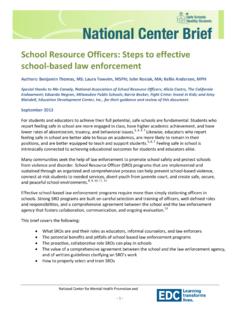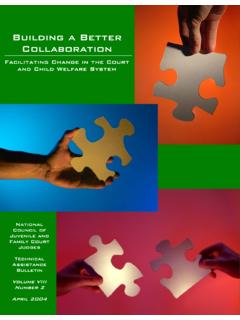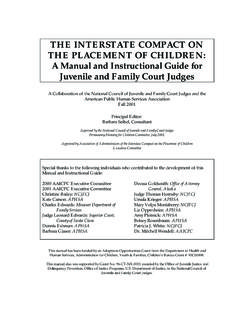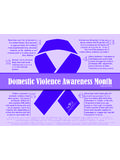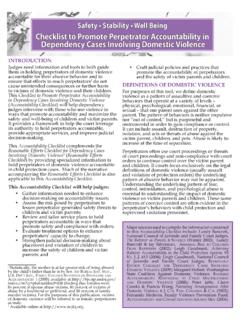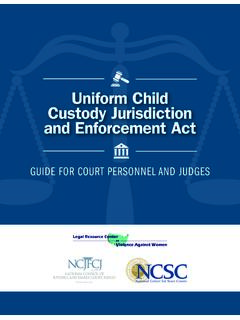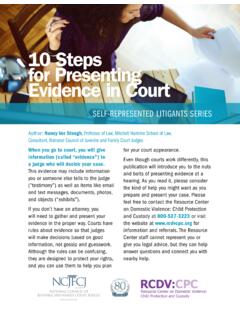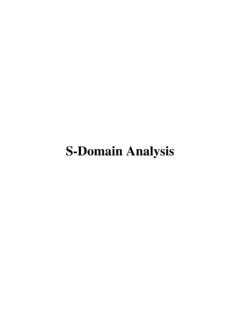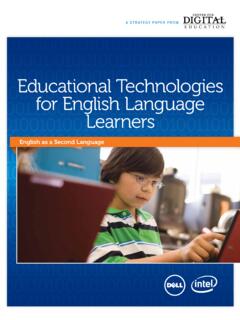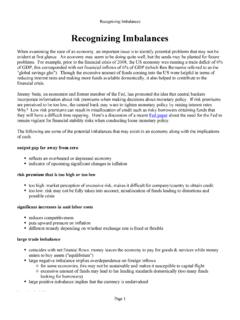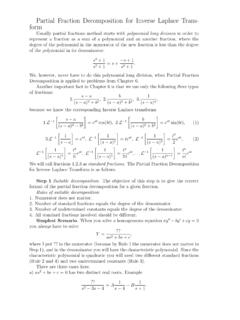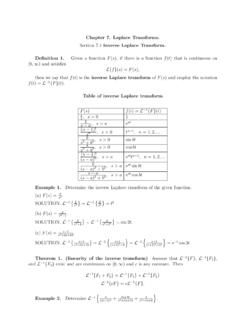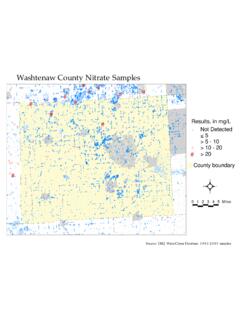Transcription of T h is d o c u m e n t w a s d e v e lo p e d u n d e r g ...
1 This document was developed under grant number SJI-03-N-103 from the State Justice Institute. Reprints for this publicationwere made possible under Grant No. 90EV0378/06, awarded by the Department of Health and Human Services. Pointsof view in this document are those of the authors and do not necessarily represent the official position or policies of the StateJustice Institute or the Department of Health and Human Custody & Visitation Evaluations in Cases with Domestic Violence: A Judge s Guide AuthorsClare Dalton, LLMG eorge J. and Kathleen Waters MatthewsDistinguished University Professor of LawLeslie M. Drozd, PhDPsychologistHon. Frances WongSenior JudgeNational Council of Juvenileand Family Court JudgesMary MentaberryExecutive DirectorBillie Lee Dunford-Jackson, JDCo-DirectorFamily Violence DepartmentMaureen SheeranCo-DirectorFamily Violence DepartmentPrincipal StaffJill D.
2 Comcowich, JDPolicy AnalystFamily Violence DepartmentNational Council of Juvenile and Family Court JudgesUniversity of Nevada Box 8970 Reno, NV 895071041 North Virginia Street Third Floor Reno, NV 89503(775) 784-6012 FAX: (775) 784-6628 NCJFCJ (2004, revised 2006) Advisory Committee Members* Nadia Abdelazim, JDStaff AttorneyCustody Advocate ProgramChildren s Law CenterCharlotte, North CarolinaMichael W. Arrington, JDManaging PartnerParkowski, Guerke & Swayze, , Delaware Jacquelynne Bowman, JDDeputy DirectorGreater Boston Legal ServicesBoston, Massachusetts Cecelia BurkeDirector Travis County Domestic Relations OfficeAustin, Texas Hon. Mike DentonJudgeCounty Court at Law 4 Austin, Texas Shirley Dobbin, PhDAssistant Director Permanency Planning for Children DepartmentNational Council of Juvenile and Family Court JudgesReno, Nevada Lisae C.
3 Jordan, JDLegislative CounselMaryland Coalition Against Sexual AssaultSilver Spring, Maryland Hon. Phyllis D. KoteyCounty Judge8th Judicial Circuit of FloridaAlachua County CourtGainesville, Florida Nancy W. Olesen, PhDPsychologistSan Rafael, CaliforniaHon. Nancy S. Salyers (Ret.)Co-DirectorFostering ResultsChildren and Family Research CenterUniversity of IllinoisChicago, Illinois Hon. Frances Q. F. WongSenior JudgeFamily Court, First CircuitState of HawaiiHonolulu, Hawaii ConsultantsClare Dalton, LLMG eorge J. and Kathleen Waters MatthewsDistinguished University Professor of LawNortheastern University School of LawBoston, MassachusettsLeslie M. Drozd, PhDPsychologistNewport Beach, CaliforniaShelia HankinsConsultantRochester Hills, Michigan Hon. William G. Jones (Ret.)Senior JudgeCharlotte, North Carolina Graphic ConsultantLarry WinklerCreative House Reno, NevadaSpecial thanks to Martha Wade Steketee, National Center for State Courts, for her contributions to the evaluation of this project.
4 * Some of the committee members or consultants have information above reflects the position they held when this toolwas originally published in Council of Juvenile and Family Court JudgesFamily Violence DepartmentWhile there are rules of evidence to direct judges in determining who qualifiesas an expert, practical resources are lacking to help judges critically review theexpert testimony of child custody evaluators, determine whether the evaluator stesting methods were accurate and reliable, or tease out the biases of individualclinicians, particularly when domestic violence is involved. This publication isdesigned to be a practical tool for judges on how to order, interpret, and act uponchild custody evaluations and includes bench cards and supplementary project would not have been possible without the generous support of theState Justice Institute and its continuing leadership in seeking to improve the quality of justice in state courts and the outcomes for families in crisis.
5 The FamilyViolence Department of the National Council of Juvenile and Family Court Judges(NCJFCJ) is indebted to all of the people who helped make this publication possible. Special thanks go to the authors, Clare Dalton, Leslie Drozd and JudgeFrances Wong, for their dedication; to the Advisory Committee members for theirguidance; to our consultants, Shelia Hankins and Judge William Jones, for theirenthusiasm and expertise; to Larry Winkler for his graphic design; to the judgesand other professionals involved in the Child Victims Act Model Courts Project forserving as reviewers of the document; to the staff of the NCJFCJ PermanencyPlanning for Children Department for their contributions to this project; and to themany experts across the country and internationally who reviewed the documentfor their insightful Family Violence Department would also like to thank the Departmentof Health and Human Services (HHS) for helping to support this important endeavor.
6 Much of the groundwork for this tool was done through the ResourceCenter on Domestic Violence: Child Protection and Custody, a project of NCJFCJand funded by Custody & VisitationEvaluations in Cases with Domestic Violence: A Judge s Guide Table of ContentsIntroduction: Why a Tool with a Domestic Violence Focus? ..7 Organization ..8 How to Define Domestic Violence ..8 The Legal Context ..9 The Ethical Context: Safety First ..10 Ordering an Evaluation: When Is Domestic Violence Expertise Necessary? ..12 What If There Are No Resources for an Evaluation? ..12Is There a Need for an Emergency/Interim Evaluation? ..12 Once Safety Is Assessed and If Resources Are Available, Should I Order an Evaluation? .13 What Do I Need to Know, from Whom, and How Do I Ask? ..16 Frame the Inquiry ..16 Choose the Expert.
7 17Be Specific about the Information You Need ..18 Articulate Expected Sources of Information ..19 Communicate Expectations about Information-Gathering Procedures ..21 Define the Obligations of the Participants ..22 Reading the Report ..24 Safety First ..24 Determine Whether to Admit the Report into Evidence ..24 Read the Report Critically ..25 Assess the Recommendations ..26 Additional Resources ..28 IIIIII56 Why a Toolwith aDomesticViolenceFocus?Navigating Custody & Visitation Evaluations inCases with Domestic Violence: A Judge s Guide IntroductionIt is more likely than not, according to current research,2that judges presiding over contested custody cases will have to grapple with two related questions: whether one parent has been physically violent or otherwise abusive to the other, and, if so, how that violence or abuse should affect the court s decisions about ongoing custody and visitation at least some cases, you may decide to use formal custody evaluations to assist you in answering those two questions: to frame the issues; gather the relevant evidence, analyze and synthesize it; and offer it to you in a format that will facilitateyour decision making.
8 The primary function of this tool is to help you determinewhether ordering an evaluation in such a case is appropriate and, if so, how to becomea more critical consumer of the evaluation not just in cases in which there is a recordof domestic violence, but also in cases in which domestic violence is alleged, or wherethe presence of other red flags raises a suspicion of domestic quality of custody evaluations, therefore, is of critical importance. Yet, not all theexperts on whom courts rely have the training and experience needed to collect theevidence adequately, evaluate it competently, or make well-supported is particularly true when a case involves domestic itmay be your experience that certain custody evaluators with whom you have workedin the past are good, it remains imperative that you critically examine allcustody evalu-ation tool will help you: determine whether the case is one that requires an evaluation; determine what the content of the evaluation should be; select the right person to conduct the evaluation; tailor the evaluation to your needs; critique it carefully.
9 And know, at the end, whether or to what extent you can rely on the evaluator s hand symbolis used throughoutthis tool to bringreaders attentionto issue areasrelated to safetyfor victims ofdomestic violenceand their every case will require or need an evaluation. This tool is written primarily to help judges determinewhether ordering an evaluation is appropriate and, if so, to ensure that the evaluations they order are ofhigh quality and properly attentive to the issues raised by domestic violence. However, a pressing concernfor many judges is obtaining independent information to facilitate decision making when neither the partiesnor the courts can afford an evaluation or tool can still be helpful, enabling judges toform partial solutions in specific cases and providing ideas for system The functions of evaluation and investigation are discussed infra, beginning at p.
10 Peter G. Jaffe, Claire V. Crooks & Samantha E. Poisson, Common Misconceptions in Addressing Domestic Violence inChild Custody Disputes, 54 JUV. & FAM. CT. , 58 (2003) (citing several studies that highlight the prevalence of custodycases with a history of domestic violence); see also, AM. PSYCHOL. ASS N, VIOLENCEANDTHEFAMILY: REPORTOFTHEAMERICANPSYCHOLOGICALASSOCIAT IONPRESIDENTIALTASKFORCEONVIOLENCEANDTHE FAMILY100 (1994) (stating that custody and visita-tion disputes appear to occur more often in cases in which there is a history of domestic violence).3 For purposes of this Guide, evaluation refers only to the work product of those professionals qualified to evaluate thedata and form an opinion about the parties in a contested custody case based upon their training and experience. Courtpractice is sharply divided on the question of asking evaluators or investigators to make recommendations.
